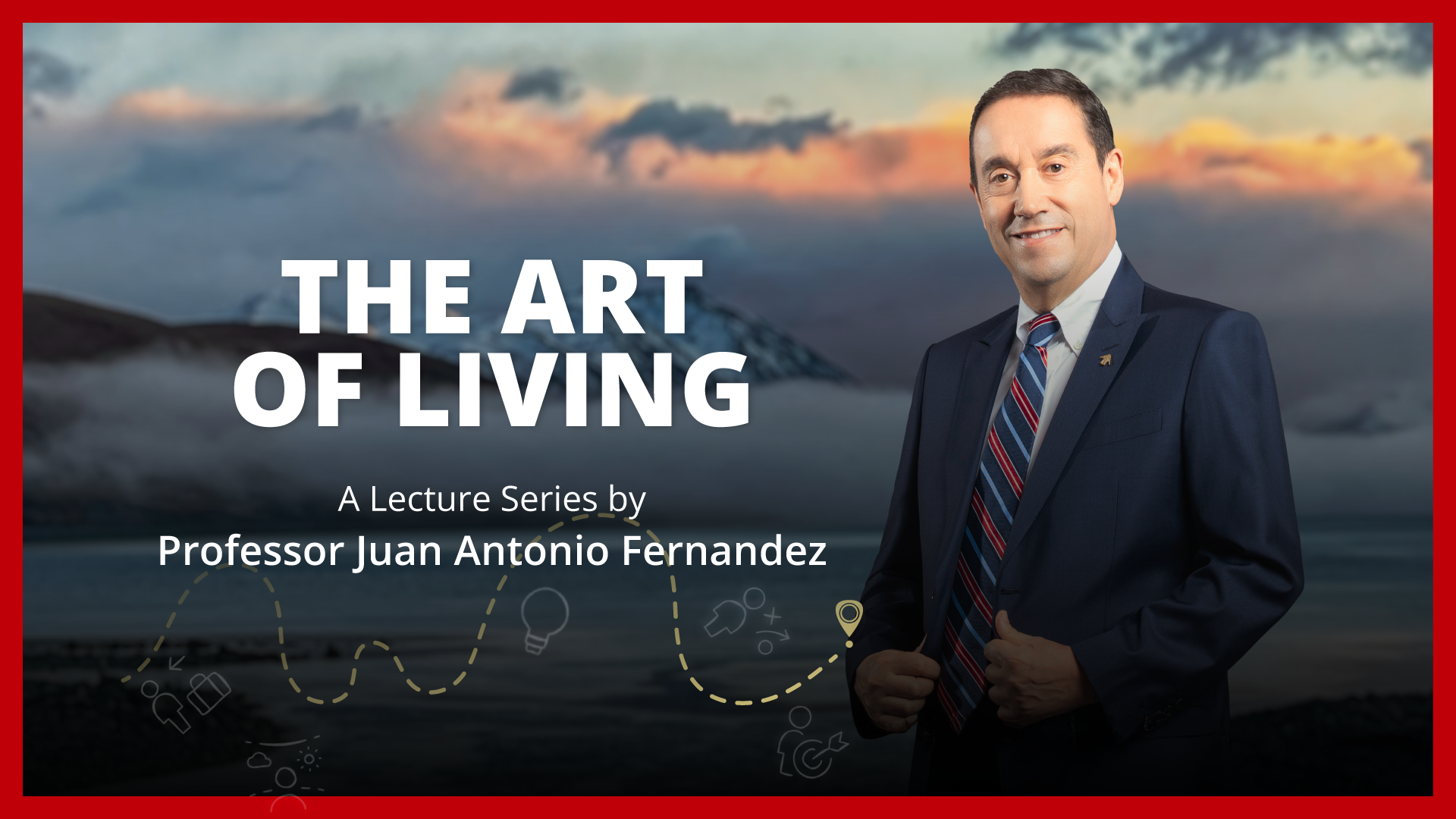The Art of Living is to be a Fighter, not a Victim

The Art of Living is a lecture series by CEIBS Professor Emeritus Juan Antonio Fernandez, offering insights gleaned from a life full of experience into how to find your individual definition of success, identify effective life goals, and create personal growth and meaningful development.
Read on to discover ideas that can help you to achieve your personal and professional aspirations.
01 – Departure
What does success mean to you? Defining success for an individual is an intensely personal matter, as it requires the careful consideration of both external (e.g. wealth, recognition, power, career advancement) and internal factors (e.g. family, friendships, and overall sense of purpose).
These goals are not contradictory – they are in fact often complementary – but how you balance them will change as you go through the different chapters of your life, as your personal circumstances, goals and ambitions will necessarily change as well.
No matter your age or career situation, however, it’s never too early or too late to consider what your “ideal life” could entail. Once you have visualised it, and defined exactly what success means to you, you can actively take steps to achieve it. This process begins with the understanding that you have self-determination; you are free to choose the life you want, based on a rational exploration of your current circumstances, future goals and viable pathways to achieving your ideal life.
Aristotle referred to this process as achieving eudemonia, which means “happiness” or, more appropriately, “flourishing”. His belief was that with a clear understanding of one’s situation, a realistic plan for success, and the will to act, a person may flourish, becoming the best version of themselves.
To flourish in this manner, you must first recognise that success and failure are not opposites; they are in fact close relations. The direct opposite of “success” is “inaction” – those who do not act to secure success for themselves are victims, blaming their circumstances or the actions of others. Those that achieve success, on the other hand, will do so because they consistently choose to act even in the face of failure, focusing on the things that they can control. If they are knocked down five times, they will get up six times.
To pursue and achieve eudemonia, you must choose action over inaction. You need to fail until you succeed. You need to choose to be a fighter, rather than a victim.
With this mentality firmly in place, you will have taken the first of five steps towards your ideal life. These five steps are
- Departure – Choose to take action
- Exploration – Review your current life
- Creation – Outline your “ideal life” based on your ideal of success
- Action – Take decisions necessary to achieve this ideal life
- Arrival – Achieve and maintain your ideal life
Now that we have finished examining Departure, we will five into the remaining steps.
02 – Exploration
All successful planning is predicated on a firm grasp of one’s current situation. Consider the following eight elements of your life, ranking how satisfied you are in each area with a score of 1-10.

Using what is known as the “Wheel of Life” approach allows you to map out which key areas of your life are going well, which are going poorly, and how you can bridge the gap.
You’ll notice that the first four elements – a full 50% of the wheel – refer to you, while only 25% relate to others, with 25% related to your work. Placing this amount of emphasis on yourself isn’t selfish; it is necessary to take care of yourself first to help you manage the other half of the wheel. You are the foundation, and without proper self-care, your life will quickly collapse.
Some simple yet effective strategies for improving different elements of the wheel include:
Health – It sounds simple, but remember to eat, move, and sleep. Good nutrition paired with appropriate, regular exercise is essential. Consistently good sleep is similarly vital for maintaining productivity, energy levels and overall attentiveness. Adults need around 7-9 hours a night, so improve your quality of sleep by maintaining a regular evening schedule and try to resolve your worries before going to bed. Doing so can be as simple as writing down any concerns on a notepad before you sleep, so that you are ready to address them the next morning.
Growth – Embrace lifelong learning. Personal growth is about more than getting better at what you know; take time to make new discoveries wherever possible.
Spirituality – Connect with something bigger than yourself. Nature, art, music, religion – these are all worthy areas for exploration that may help you gain clarity and perspective in other aspects your own life.
Relations – Don’t let digital devices get in the way of meaningful interactions with the important people in your life. Be attentive to their needs and value your time with them. Remember that different types of friendships can be valuable in different ways, but avoid toxic friendships at all costs.
Work – Try, if you can, to find a job that suits your passion, suits your skillset, and is valued by others. These three reinforcing factors together rarely fail to create an ideal working situation.
03 – Creation
In this stage of the journey, which is about creating purpose, visualise talking to your future self in five years’ time, under three very different scenarios:
Scenario 1: You have continued on your current path, addressing your current ambitions and priorities.
Scenario 2: You have pursued your passion during the past five years.
Scenario 3: Somehow, you have received $100 million, meaning there are no longer any financial constraints on your life.
In each scenario, imagine what you are doing, what your life looks like, and how you feel about it. Imagine how your present and future selves would share notes on their respective lives and what their different levels of happiness or eudemonia might be. Determine which scenario might bring you the greatest chance to flourish.
While each scenario will involve different levels of success in varying life aspects depending on the individual, the broad focus of each can be characterised as below:
Scenario 1: Stronger focus on external success factors – wealth, recognition, power, working to advance one’s career.
Scenario 2: Stronger focus on internal success factors – family, friendships, working to achieve a deeper sense of purpose.
Scenario 3: Living one’s life primarily to pursue interests or ambitions that are not based on pragmatic concerns.
Your preferred scenario should help highlight which success factors matter most to you, providing a pathway to visualising your ideal life.
Also remember that your ideal life must have meaning, not just the trappings of success. As Professor Viktor Frankl, author of Man’s Search for Meaning famously said: “Do not pursue success. Success will happen when you have a meaningful life.” To map out the meaning of your ideal life, think of it as a tree.
The roots are your values. With strong values, you are solidly grounded and able to maintain the trunk of the tree, which is your purpose. A sense of purpose provides strength and direction, allowing the branches (your choices) to take shape naturally. When all three of these elements are aligned, you will have a meaningful life.
04 – Action
When we face choices in life, we know that we should take a rational approach, employing logic and analysis based on available data. However, emotion is often an invaluable factor in the decision-making process as well. After analysing your current life, and visualising your ideal life, taking action to achieve it will require a combination of both rational analysis and emotional commitment.
Making big life decisions broadly follows one of two approaches:
Jumping into the Ocean – This is an instinctive, assertive approach in which you take a big decision based on a strong sense that it is right for you, and that you would regret not doing so. This is the approach exemplified by Amazon CEO and Founder Jeff Bezos, who cites the importance of “regret minimisation” in his decision making, as well as having the support of close family, friends, and/or business partners who want to help you see it through.
Test the Water – This is a more methodical, step-by-step approach, in which you map out how to achieve a major life change (e.g. a new job, moving to a new country, or exploring new relationships) through more gradual, incremental change.
Both approaches have their strengths, depending on the scenario at hand and the personality of the decision-maker. Whichever you prefer, always try to connect with your emotions when making important life decisions. Pay attention to your initial reaction to the situation, and recognise the value of your instincts or “gut feeling”. If possible, explore these insights further by talking them through with someone you trust.
Once your decision is made, support it by pursing life projects that further your progress towards that goal. It could be working on a PhD, working on a creative project, or something even more personal, such as hitting a weight loss goal. Life projects provide structure and stability to your long-term efforts to create your ideal life.
Having defined what you want and decided what to do and how to do it, it’s time to enact change using the three following steps.
1: Focus on a handful of limited objectives, meaning those that are central to what you want to change in your life. Create habits that support this change, remembering that incremental change is better than ambitious failure, and that success is self-perpetuating.
2: Create a positive inner climate. Treat yourself with respect, recognising your strengths and accomplishments. Face the future with positivity.
3: Secure support from others. Important people in your life are key resources to help you achieve personal change. You can learn from them, and they can give you emotional support. Be open to their feedback and offer for the same to them.
05 – Arrival
Each of these five steps – Departure, Exploration, Creation, Action and Arrival – hinge on your ability to cultivate self-awareness and self-discipline. Both these qualities are necessary to anchor you to your present circumstances while taking action to secure your ideal future life.
This process starts by choosing to be a fighter, to embrace action over inaction. As the Chinese proverb reminds us:
“The best time to plant a tree was twenty years ago, and the second-best time is now.”









